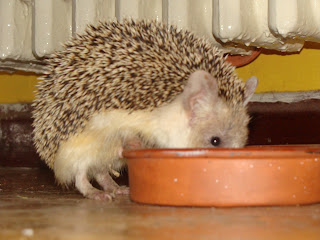 |
| I haz had ice-cream |
I am not American, do not live there, do not expect whoever
wins to invade Britain or Spain, or to solve the world’s economic problems- the
rest of us will do that, eventually- so it is for me only of sporting interest
who wins and who loses. Neither of them impresses me. They both look like
politicians to me. Different types of politician, very different, but politicians
nonetheless.
I don’t know Peter Freed’s politics, if he has any. He
appears to be doing a clinical analysis with no partisan intent. In italics are
his comments, all from the final debate between Obama and Romney on the 22nd
inst.
It’s common wisdom in psychotherapy and policing alike
that the willingness of someone to talk depends on the autonomic nervous system
status of the questioner.
I wish he had clarified in what sense the correlation goes,
and how it works. Also, why it was relevant here.
3. Mouth moistness: blood (and plasma) moves to muscles
during high sympathetic tone. It moves to the internal organs and mucus
membranes in parasympathetic tone. Mouth dryness is therefore a sign of
sympathetic tone – whoever’s mouth is dryer is losing.
I could have done with more explanation of that as well, but
there is enough to know what is happening when one or other changes tone in
that way. What he doesn’t quite say, but I assume to be true, is that in
contests like this, each combatant is aware of how the other is feeling. They
both know who’s winning and who’s losing.
4. Sentence complexity: sentence complexity is governed
by the prefrontal cortex, which orders, sequences, and prioritizes ideas. PFC
is turned off during stress – the neurons literally have cortisol receptors
that depolarize them during stress. This forces the organism back on tried and
true evolutionary strategies. Sentence complexity is therefore a marker of
parasympathetic tone.
This is absolutely fascinating. It is simply a physiological
explanation of the fact that it is harder to think when under stress. But it
gives you something quantifiable to watch for.
And do they look at their opponent first or second? In
primate fights monkeys don’t look at other monkeys unless they want aid.
Humans, of course, do the same. In confrontation, they look only
at the opponent if they are confident of beating him. If they look around, they
aren’t happy.
Obama has the forced, memorized facial expressions of a
natural beta.
'Obama is a beta.' If I were a journalist, that would be my
headline. But I am not interested in creating truth, rather in finding it (today, at least). I
don’t wish to put words in Peter Freed’s mouth. He has made a technical interpretation
of an observation of a particular gesture at a specific moment, nothing more.
But I find it easy to take it as a general truth about Obama. He is a
beta male, one of those who benefit by their ability to serve the leaders. They
may become leaders themselves, but unless they can win, or inherit, alpha
status, they are only surrogates, allowed to front for the real leader, by his gracious permission.
Many political leaders are mere figureheads, bureaucrats,
with no real ability to lead. Obama is not Gordon Brown, or that Belgian chap
with the glasses, but he isn’t an alpha male. Romney, perhaps.
Romney is raising his eyebrows frequently as though
teaching in a caring way a young mentee. This is the behavior of a benevolent
elder. Obama does not raise eyebrows as though teaching – but rather when
surprised by his own ideas. This is the behavior of a talented student. In
split screen, Romney seems to be higher status.
Hmmm. He knows his primatology. I wonder if Obama does.
In the split screen look at Obama’s flat forehead as he
gazes at Romney. This means that cranial nerve 7 is not animating the face with
nonverbal dominance signals. This studied eye contact, not automatic. I still
say he’s feeling submissiveness signals from his limbic system, hypothalamus,
feeding off Romney’s confidence, despite cognitively rejecting Romney’s
legitimacy.
More fascinating insight into the physiology of primate
confrontation and social hierarchy. This was, undoubtedly, a brutal, bloody
battle. Both are fighting for something which probably means more to them than
their lives, at least at that moment, and they have to convince a huge,
unpredictable audience that they should live and their opponent die. The stress
of these occasions must be enormous. It is only the preparation of the
candidates, who have been doing this all their lives, that stopped them from
screaming at each other like guests on Jerry Springer.


3 comments:
Well, I've not seen it analysed in this kind of detail, even down to the eyebrows.
Neither have I. The details of how certain nerves react to the perception and acceptance if one's own status in the group is particularly intetesting.
Beautiful HH pics. Isn't he lovely?
Post a Comment